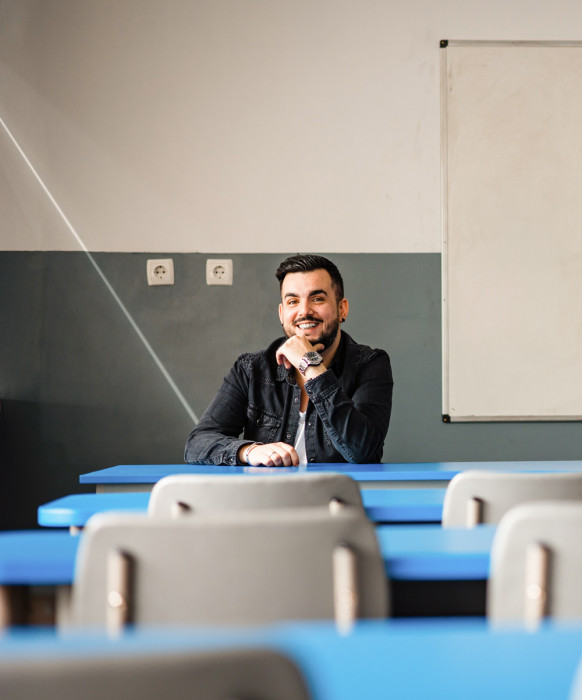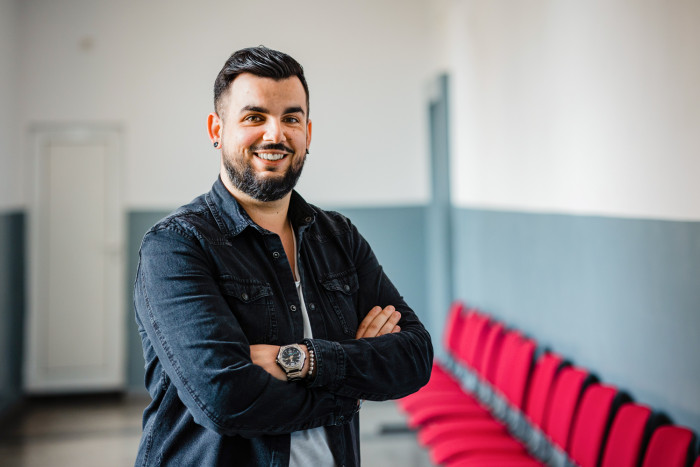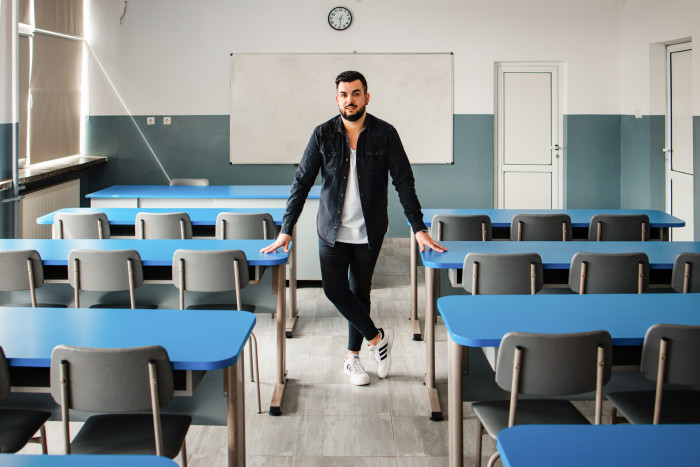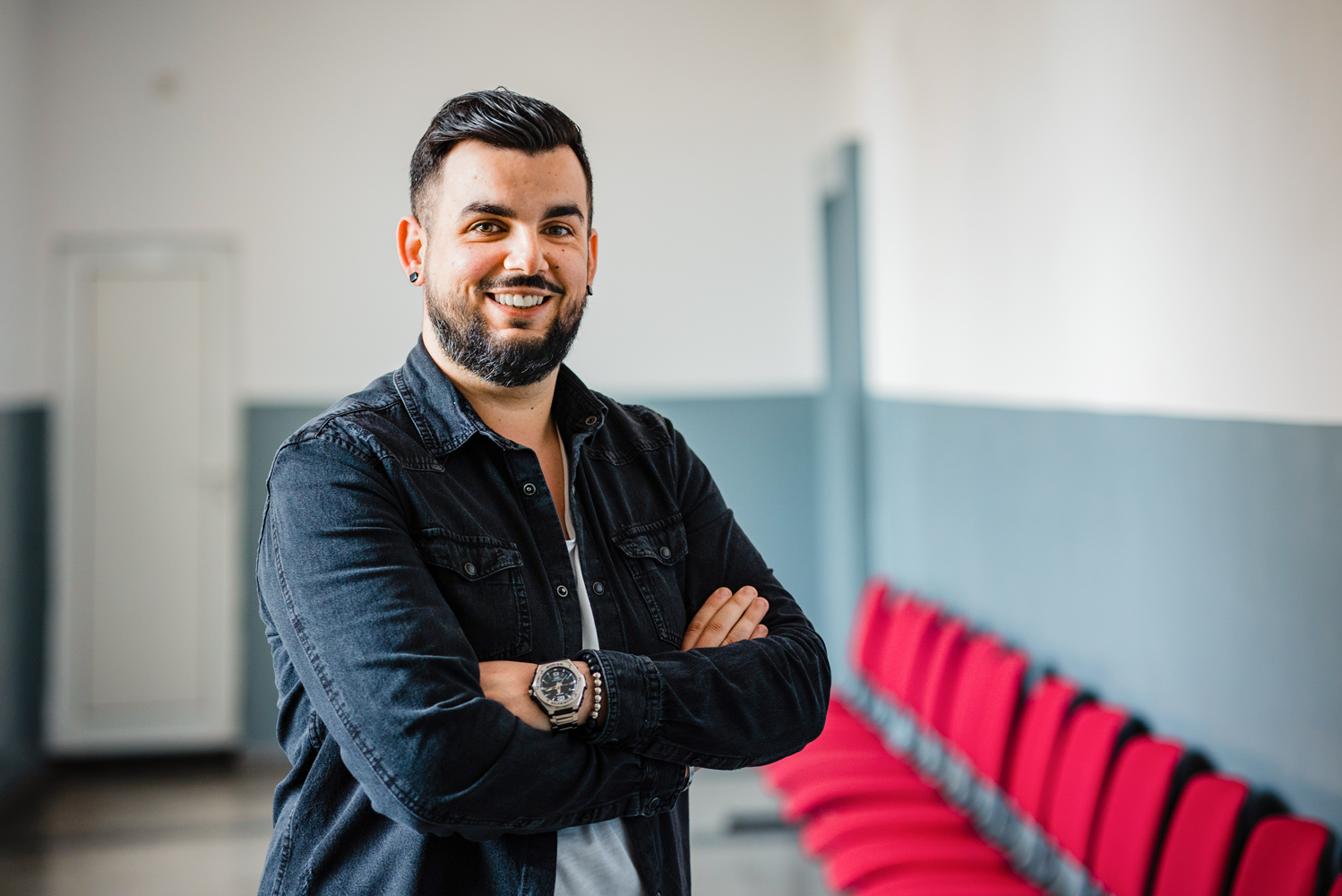The teacher educates and forms people
Alexander Tachev is only 28 years old, but students consult with him in various life situations and are convinced that he is a "great psychologist". How the young philosophy teacher, with only four years of practice, manages to gain the trust of young people and meet the high requirements for this profession, read in the joint section of the publishing house Klet Bulgaria and 24 hours "Teachers of Bulgaria".
Alexander Tachev teaches Philosophy to students 8. to 12. class at Pleven Secondary School "Stoyan Zaimov". His whole life seems to be connected with this school. Not only is he a graduate of the high school, but his mother was a philosophy teacher there. Naturally, Alexander is an excellent student, with no opportunity to go unprepared to class or hide any grade. As a teacher, Alexander's mother is distinguished by her sense of humor and ability to predispose students. This interaction impressed Alexander and philosophy and psychology became his favourite subjects. Today, Mr. Tachev strives to apply the same approach in the classroom, but at that stage of his life, perhaps because of the authority of the parent-teacher, he dare not even imagine himself standing behind the chair.

After high school, he applied to the University of Veliko Tarnovo and was accepted on his first attempt at the Faculty of Philosophy. "Logic used to be very difficult for me, now I have to teach it, but at least I learned it", Alexander says with a sense of humour. The path back to his high school opens with such ease that it seems to have been preordained. Having just finished his semester, Alexander decided to apply for a job at Stoyan Zaimov University. He submits his papers and is surprised to find out just hours later that he has been accepted. The date is 10 September. So in just five days, the future teacher has to prepare for the start of the school year with lessons and assignments - all things that are not taught at university. He also has no idea how he will overcome his innate shyness when he stands in front of the students. He still remembers the practical exam as one of his scariest experiences, standing in front of the staring eyes of the 11th graders, trembling with embarrassment.
This is how Mr. Tachev began his path in the teaching profession at the modest age of 24. His colleagues actually became his former teachers, for whom he continues to feel great respect and to address as "you". He still finds it strange to speak to them on a first name basis, even though after four years he has gained teaching experience and confidence. "The university does not give knowledge about the profession itself, the colleagues here are invaluable," says Mr Tachev.
His mother, although now teaching at another school, remains one of his main role models. From her, she takes the approach that the teacher should be friends with the students but also be demanding and keep boundaries. This balance is key because the work is very dynamic, something different happens every day. Getting to know the students and good communication builds mutual trust and respect, and therefore facilitates the learning process.
Alexander gives the example of the tenth graders, for whom he became a class teacher this school year. He teaches them and they know each other from before, but he's just now really getting to know them. And in a year with a pandemic and online learning. "I give my best, but the situation makes it difficult, more difficult to control," says the young teacher. In class, children behave differently, share more with the class teacher and rely on his understanding. Regardless of the closeness in their age, Mr. Tachev does not allow them to familiarize or abuse his trust, when there is a problem he tries to find out what is the reason for a certain action and so the student can analyze and evaluate his behavior himself.

The first time a student asked him for advice about a family problem, Alexander realized that he was already perceived as someone they could learn from and listen to. In another case, a young man who broke glass asked him to confess. Any teacher with years of experience can recognize themselves in such a situation, but when you are young and it happens to you for the first time, you actually realize how much responsibility you have because you are educating and shaping people. Of course, Mr. Tachev advised the teenager to confess and raise money to restore the glass, but he also taught the students something else - if something unpleasant happens to us, it is a necessary lesson for us, through experience we learn about ourselves and others, and for every thing there is a reason and a specific time, place and people to happen. Responsibility is one of the main things philosophy deals with. Knowing views from thousands of years ago gives you knowledge that expands your worldview. Alexander also often gives examples from his life experiences and, despite his youth, skillfully relates what is written in the textbook to our human nature.
"The role of the teacher is to push and guide children in the right direction. The teacher is the door to knowledge, but the student decides whether to enter," Mr Tachev is convinced. Mr. Tachev is not content to simply tell the material, but through discussion and free sharing of opinions wants the children to absorb and make sense of the information and come to their own conclusions. Following the life wisdom "repetition is the mother of knowledge", he often tests different students on the same questions. Sometimes it turns out that the second person cannot answer because he is not prepared, but he has not listened to the answers of the first person. So Alexander teaches another important lesson - the ability to concentrate in what we do to give maximum quality in what we do.
The lessons include many topics for discussion. In psychology classes, they discussed the role of body language in communication. Mr Tachev had to guess when someone was telling a lie, when - the truth. The children were impressed by their teacher, concluding that he was a "great psychologist."

The young teacher enjoys the dynamics of his work, meeting many people, having fun with both students and colleagues. In a class, even if just one student is absent, it changes the vibe, everything is different, absolutely the whole class and the whole day changes. " His flair for sound, harmony in the class is partly due to his love for music, which is his hobby and passion. Just as he successfully composes electronic music, he senses what children think and want. And, as if to have a complete consonance in the tonalities of the people with whom life meets him, his future wife is also a teacher. They share their experiences at home and help each other.
"The profession requires enormous patience and one must really feel that this job is for them. You go home and keep thinking about work. All the effort is worth it for the moment when you realize that you have earned the trust and friendship of your students," Alexander is convinced. "Being a teacher is a vocation. This profession is fundamental to humanity because teachers not only teach the lessons, but also build the future generation."


